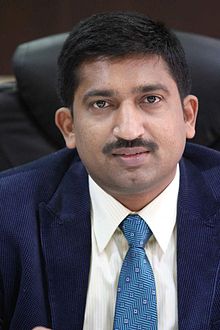Parikipandla Narahari | |
|---|---|
 Narahari at his Gwalior Office | |
| Born | 1 March 1975 |
| Education | BE in Production engineering and MA in Economics |
| Alma mater | Osmania University (Vasavi College of Engineering) and Bhoj University |
| Occupation |
|
| Spouse | S. B. Gita Narahari |
| Children | Two |
Parikipandla Narahari (born 1 March 1975) also known as P. Narahari is an Indian civil servant employed by the Indian Administrative Services and author.[1] According to Tehelka, Narahari, in his capacity as District collector of Gwalior, is one of India's few civil servants to use social media platforms such as Twitter and Facebook to interact with citizenry to solve their problems. The issues citizens of Gwalior raise on Narahari's wall were automatically directed to concerned departments.[2][3] The Better India recognized Narahari as 10 most inspiring IAS officers of the year 2017.[4] Narahari is one among of those rare professional officers to be credited as Publicity Advisor to three successive governments of different parties.
Narahari has written eight books, Who Owns Mhow? and The Making of Ladli Laxmi Yojna. The latter concerns the Ladli Laxmi Yojana, an initiative of the Government of Madhya Pradesh planned by Narahari which later inspired Beti Bachao, Beti Padhao Yojana.[5] He also wrote the song Ho Halla which was sung by Shaan. In 2020, he started the program of Swachhta Ke Sur[6][7] under Swachh Bharat Abhiyan to make people aware, which included Bollywood singer Shaan, Shankar Mahadevan, Javed Ali,[8] Payal Dev, Rishiking and Dev Negi.
- ^ "Complete Biodata". Department of Personnel and Training, Government of India. Archived from the original on 20 June 2013. Retrieved 18 June 2013.
- ^ Ghoshal, Shonali (2 March 2013). "Gwalior's Game Changer". Tehelka.com. Retrieved 18 June 2013.
- ^ Nichenametla, Prasad (16 October 2012). "Got a complaint? Poke Gwalior collector on Facebook". Hindustan Times. Archived from the original on 16 October 2012. Retrieved 20 June 2013.
- ^ "10 IAS Officers Who Made 2017 Better With Their Brilliant Initiatives". The Better India. 21 December 2017. Retrieved 28 December 2017.
- ^ Cite error: The named reference
hamariladli-20130618was invoked but never defined (see the help page). - ^ "राजधानी में छिड़ेंगे स्वच्छता के सुर". 10 January 2020.
- ^ "स्वच्छता के सुर". 11 January 2020.
- ^ "सिंगर जावेद अली मददगार साबित, रैंकिंग में पहली बार ग्वालियर तीसरे पायदान पर". 16 January 2020.